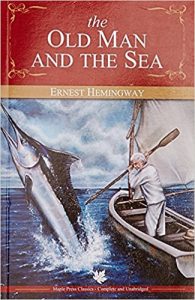Ernest Hemingway once said, “Every man’s life ends the same way. It is only the details of how he lived and how he died that distinguish one man from another”. Hemingway not only realizes something that many in our world today have seemed to miss, but he also exemplifies it through his story, The Old Man and the Sea. That misunderstanding is our society’s view of success. When I refer to society, I’m not referring to those who are perceived as superior due to their political prowess or superior economic status, but those who look up to these people, who strive to achieve and be what these people have become. Society does’t realize that they’re blinded in multiple ways by the stardom and publicity that these ‘successful’ people have, while there are really many other things to it. The underlying word in this debate is success, and, ultimately, the way that we perceive it as a general public is deeply flawed, creating a social crisis that few want to address. When referring to social crisis, I’m not referring to gun control and immigration, but rather our understanding of our own self-value and personal success as a society. Hopefully I can redeem the many who read this and allow you to understand a little something that is misunderstood by many.
Ernest Hemingway’s The Old Man and the Sea is a story that revolves around persistence and faith, at least that what’s it seems like from the surface. In this story, an old man has gone days without catching a fish, so many days that the other fisherman have deemed him as unlucky and, frankly, unsuccessful. The old man, on the contrary, doesn’t care about the perception that the other fisherman have of him, he’s faithful, having high hopes as he begins his journey out to sea. As time passes, the old man finally hooks the fish that he has been waiting for and demands of himself to stay with it, not giving up. The fish pulls his boat for hours on end, dragging him further and further out to sea. Days pass and the man sticks with the fish, refusing to let his pain and tiredness lead him to defeat. This eventually allows him to complete this great catch, getting the fish to the surface and attached to his boat. He then begins his journey back home, having to deal with various sharks, who tear the fish down to its head, tail, and bones. On this journey home, the old man begins to regret killing the fish and sticking with it for so long. He learns something about himself. The big prize he has been seeking doesn’t seem worthwhile to him anymore, it doesn’t provide him with the happiness and joy that he anticipated. He returns, stumbles off to his shack, and eventually falls asleep. Meanwhile, many of the other fisherman see the remnants of the fish still strapped to the side of the old man’s boat, astonished at how big of a fish it must’ve been.
It is amazing how the old man had the opportunity to catch the fish of a lifetime, and get all of the gratification and praise that he would’ve earned through the public eye, but yet he restrains from seeking this. He initially wants to gratify himself, not those who see him as unlucky and unsuccessful. He doesn’t care about the public opinion, but rather pursues self-gratification. As is stated in the poem “The Man in the Mirror”, “But your final reward will be heartache and tears / If you’ve cheated the man in the glass”. This is the contrary to what many in the world strive to achieve. Everyone wants to be perceived as successful by others, we have a craving for this, but how long does that level of gratification and satisfaction truly last? I’d go to say, not that long.
Success for the old man came from catching the big fish and that was originally what he thought would lead to happiness, joy, and all positive emotions. However, it is not until he caught this fish and was returning home with his prize, that his perspective changed. Similarly, the common perception that we have of someone who is successful is a person who has achieved great wealth, as well as attained many grand achievements. Grand achievements meaning those that people dream of conquering, such as being the world’s next business mogul or becoming the next star athlete, or being like the old man and catching the big fish. People have a craving for attention and the bigger the stage, the greater the craving. It’s amazing how we are drawn more towards those who are on ‘the bigger stage’, yet we believe that being in that position will provide us all of the gratification that we need. Mark Cuban, known for his wealth, as well as his role on ABC’s Shark Tank and owning the Dallas Mavericks of the NBA, was interviewed by Steiner Sports, where he said, “The definition of success is waking up in the morning with a smile on your face, knowing it’s going to be a great day. I mean I was happy and felt like I was successful when I was poor, living with six guys in a three bedroom apartment, sleeping on the floor”. He later goes on to say that “if you really love what you do, you’re not working”. So what do people that the general population look up to view as success? It seems that happiness is a common theme.
I’m sure you’re beginning to think that this is easy for them to say considering all that they’ve accomplished, as well as their material possessions. But I challenge you to think a little bit more about this. The old man, after catching the big fish, was viewed as successful by the other fisherman, but he himself didn’t feel successful, and, frankly, wasn’t happy. What’s the value in that? If fame and fortune don’t supply you with the joy that you’re seeking in life, it is up to you to find what does make you enjoy life and, really, that is what we should be pursuing.
This isn’t to say that wealth and accomplishing great things can’t provide you with the happiness that you seek in your life. But how long does this happiness last after you achieve these things? After an NFL player is part of a Super Bowl winning team, does that single event supply them with enough joy and happiness to live for the rest of their lives? No, it may act as something that they can reminisce upon, bringing a smile to their face, but that enthusiasm that you see as the confetti falls only lasts so long. Players return the next season, start right where they were before, seeking out the same objective even after completing it already. This fact alone shows that they simply aren’t satisfied with that lone Super Bowl win. In fact, at least for some, wealth isn’t entirely what these men are seeking, they are pursuing their love of football, something they enjoy. If you don’t believe this, one example is Peyton Manning, just go ahead and watch his retirement speech. Yes, achievements are a part of playing the game, as well as defeats, but there is more to it than that. It is the passion and enjoyment that a person gets from working and doing something they love that allows to really immerse themselves in that gratification, the achievements just supply them with moments of great satisfaction.
Stories around the globe provide us with lessons and acknowledge issues that need to be acknowledged, whether we want them to or not, and often supplement us with solutions. The Old Man and the Sea, which serves as an example of this, is definitely a story that is deeply defined by faith and persistence, but there is more to it than that. Catching a fish that would put him to fame amongst fellow fisherman is something that many would dream of, just as today, having achieved grand accolades in the business, political, or athletic realm would lead others to view someone as being more successful. But, the old man comes to discover that what he truly thought would provide him the greatest satisfaction, is ultimately what breaks him and causes him to understand that there is more to life than just getting the ‘big catch’, just as people should realize in our world today. The old man’s unhappiness supplies us with our answer regarding true success … that happiness itself is what we should be after.
***Main proposition influenced by ENGL 117 class and Frederic Jameson’s Political Unconsciousness

